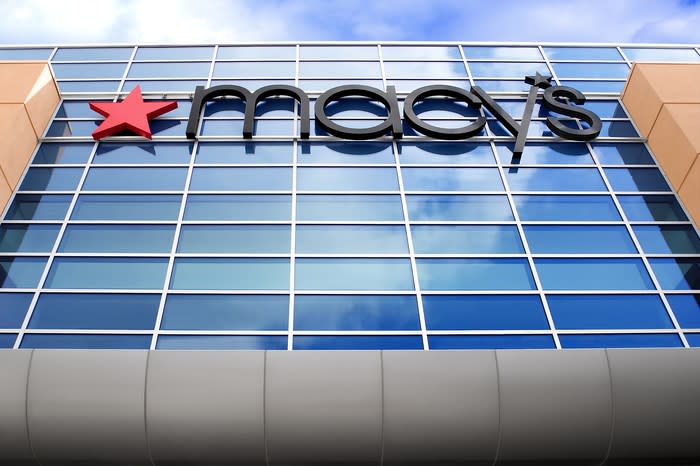These 3 Rock-Solid Retailers Don't Share Macy's Pain
Macy's (NYSE: M) stock recently plunged to a 10-year low this week following an ugly second-quarter earnings report that featured nearly flat comps growth, contracting margins, and a 60% drop in its adjusted EPS. The department store chain also expects its comps growth to stay roughly flat for the year as its earnings tumble about 30%.
Macy's performance implosion burned many other retail stocks, which were already struggling with concerns about tariffs and a possible recession. But as with all sector-wide sell-offs, many babies were tossed out with the bathwater. Let's examine three solid retailers that were unfairly caught in Macy's blast zone.

1. American Eagle Outfitters
American Eagle Outfitters (NYSE: AEO) is one of the few mall-based retailers that has thrived in the retail apocalypse. It generated positive comps growth for 17 straight quarters. Its namesake brand grew for eight straight quarters, while Aerie -- its higher growth lingerie and activewear brand -- posted 18 quarters of growth. Its digital sales also rose by low double-digits last quarter and accounted for 30% of its revenue.
American Eagle is the second most popular apparel brand for teen shoppers in the U.S. after Nike, according to Piper Jaffray. Its women's jeans are a big reason. Aerie -- which brands itself as the "anti-Victoria's Secret" with body-positive marketing campaigns, lower prices, and a wider range of sizes -- consistently generates double-digit comps growth.
AEO's gross margins held steady between 30% and 40% over the past five years as other rivals -- including Aeropostale, American Apparel, and The Limited -- filed for bankruptcy. It also kept opening new stores, especially for Aerie, which indicated that it remained a best-in-breed retailer in the cutthroat apparel market.
AEO also consistently repurchases shares, currently pays a forward yield of 3.4%, and trades at about 9 times next year's earnings. Analysts expect its revenue and earnings to rise 6% and 9%, respectively, this year -- which means it's faring much better than Macy's.
2. The TJX Companies
The TJX Companies (NYSE: TJX) owns off-price retailers like T.J. Maxx, Marshalls, HomeGoods, HomeSense, and Sierra Trading Post. TJX leverages a massive network of worldwide buyers to purchase goods at offseason, clearance, and liquidation prices, and it then sells them back to customers at lower prices than Amazon.
This makes TJX a beneficiary of the retail apocalypse, since struggling brick-and-mortar retailers are desperate to dump their inventories at rock-bottom prices. TJX then quickly rotates those products through its stores, which encourages shoppers to return often and hunt for bargains. TJX also benefits from economic downturns, which drive more cash-strapped shoppers to its stores.

That's why TJX expects its comps to rise 2% to 3% this year, which would mark its 24th straight year of positive growth. Its margins face some pressure from higher supply chain costs, higher freight costs, tariffs, and new store openings -- but those costs also indicate that the retailer is expanding instead of shrinking and spinning in circles like Macy's.
TJX also consistently repurchases shares and pays a decent forward yield of 1.7%. Wall Street expects 6% sales growth and 8% earnings growth this year, and the stock trades at a reasonable 18 times forward earnings.
3. LVMH
LVMH (OTC: LVMUY), the biggest luxury brands company in the world, is another recession-resistant retail stock. Recessions affect high-end luxury brands much less than cheaper brands, and demand for LVMH's sprawling portfolio of 75 brands -- including Louis Vuitton, Dior, Bvlgari, Loewe, Givenchy, and Hennessy -- remained robust in recent years.
LVMH's organic revenue rose 11% in 2018, operating margin across all businesses expanded, and its net profit rose 20%. That momentum continued in the first half of 2019, with organic revenue rising 12% and net profit growing 14%.
LVMH's sales improved at all of its business units during the first half, led by 18% organic sales growth in fashion and leather goods. Big partnerships with Rihanna and Stella McCartney should support that core unit's future growth. LVMH is also well insulated from the trade war since it's based in France and generates plenty of growth from affluent Chinese consumers.
LVMH's P/E ratio of 27 is reasonable relative to its growth rate, and it pays a decent forward yield of 1.7%. Many U.S. investors overlook this retail giant since it trades on the pink sheets, but it's one of my favorite defensive stocks for a volatile market.
John Mackey, CEO of Whole Foods Market, an Amazon subsidiary, is a member of The Motley Fool's board of directors. Leo Sun owns shares of Amazon, American Eagle Outfitters, and LVMH Moet Hennessy L.V. (ADR). The Motley Fool owns shares of and recommends Amazon and Nike. The Motley Fool recommends The TJX Companies. The Motley Fool has a disclosure policy.
This article was originally published on Fool.com

 Yahoo Finance
Yahoo Finance 